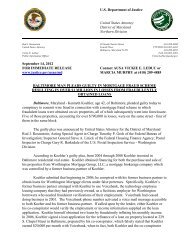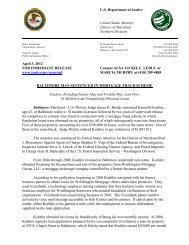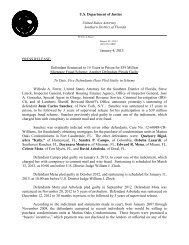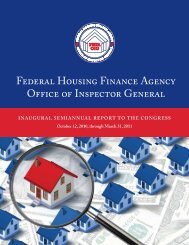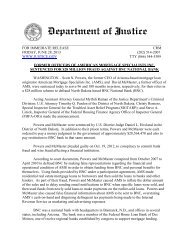FEDERAL
Sixth Semiannual Report to the Congress - Federal Housing ...
Sixth Semiannual Report to the Congress - Federal Housing ...
- No tags were found...
You also want an ePaper? Increase the reach of your titles
YUMPU automatically turns print PDFs into web optimized ePapers that Google loves.
indemnification payments that OIG previously<br />
commented on. See 78 Fed. Reg. 28,452 (May 14,<br />
2013).<br />
OIG made two comments concerning the rule.<br />
OIG’s first comment critiqued the efficiency of<br />
FHFA’s proposed two-stage approval process.<br />
FHFA plans initially to review and approve any<br />
golden parachute agreement into which a GSE<br />
seeks to enter and then to review and approve<br />
the actual payments made pursuant to such an<br />
agreement if the GSE is subject to a specified<br />
“triggering event.” Such events include a GSE<br />
being insolvent, subject to control by a conservator<br />
or receiver, in a troubled condition, or suffering<br />
from a poor composite rating. OIG contended<br />
that this two-stage approval requirement will<br />
render the first approval meaningless and, thus,<br />
will create a perverse disincentive for FHFA staff to<br />
scrupulously analyze golden parachute agreements<br />
because oversight mistakes theoretically can be<br />
fixed at the payment stage, assuming a triggering<br />
event occurs. OIG also noted that the two-stage<br />
process could hinder the GSEs’ ability to recruit<br />
and retain well-qualified employees, who may<br />
not work for them if compensation agreements<br />
are subject to later revision (i.e., years later at the<br />
payment stage).<br />
OIG’s second comment pertained to the<br />
procedures applicable to FHFA’s payment approval<br />
process (i.e., the “second approval”). The draft rule<br />
provided that when deciding whether to approve<br />
payments, FHFA might consider negative factors,<br />
such as any fraudulent act or omission; breach of<br />
fiduciary duty; violation of law, rule, regulation,<br />
order, or written agreement; and the level of willful<br />
misconduct and malfeasance on the part of the<br />
party who would benefit from the payments.<br />
Further, the draft rule stated that such factors may<br />
create a presumption against approval, but it did<br />
not specify how FHFA will evaluate such factors or<br />
what showing would rebut the presumption. OIG<br />
recommended that FHFA should articulate the<br />
criteria that it will apply when weighing negative<br />
factors and define the showing required to rebut<br />
the presumption against approval. These revisions<br />
would avoid future claims alleging arbitrary and<br />
capricious action by FHFA and would facilitate<br />
development of an accurate, transparent audit<br />
trail, allowing OIG and other interested parties to<br />
review FHFA’s decision making.<br />
FHFA did not revise the proposed rule to address<br />
OIG’s comments.<br />
Communications and Outreach<br />
A key component of OIG’s mission is to<br />
communicate clearly with the GSEs, industry groups,<br />
other federal agencies, Congress, and the public. OIG<br />
facilitates clear communications through its targeted<br />
outreach efforts, hotline, coordination with other<br />
oversight organizations, and congressional statements<br />
and testimony.<br />
Outreach<br />
During the reporting period, OIG staff made over 50<br />
presentations to law enforcement officials, real estate<br />
and banking industry professionals, and homeowners.<br />
The presentations to law enforcement officials were<br />
made to multiple mortgage fraud working groups<br />
across the country and individual federal agencies<br />
responsible for investigating mortgage fraud, such<br />
as the FBI, HUD-OIG, and the Secret Service.<br />
In addition, OI developed its partnership with<br />
the National Association of District Attorneys to<br />
train local and state law enforcement officials and<br />
prosecutors throughout the country, putting on 11<br />
presentations in 11 cities: Ft. Myers, Florida; Boston,<br />
Massachusetts; Princeton, New Jersey; Portland,<br />
Semiannual Report to the Congress • April 1, 2013–September 30, 2013 35



